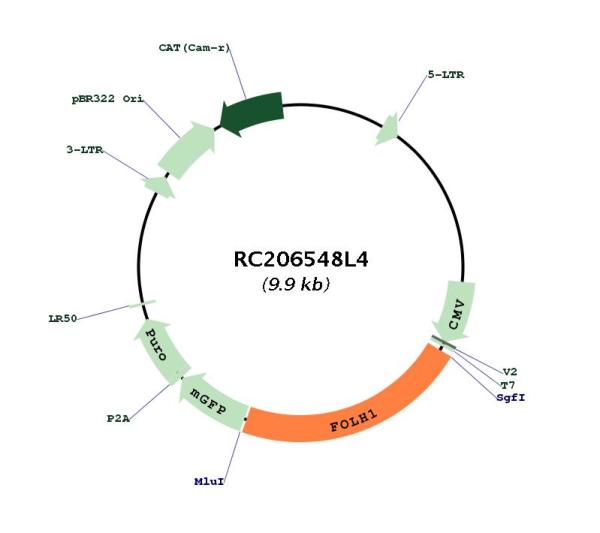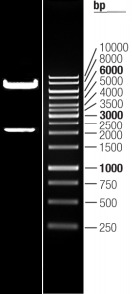PSMA (FOLH1) (NM_001014986) Human Tagged Lenti ORF Clone
CAT#: RC206548L4
- LentiORF®
Lenti ORF clone of Human folate hydrolase (prostate-specific membrane antigen) 1 (FOLH1), transcript variant 2, mGFP tagged
"NM_001014986" in other vectors (6)
Need custom modification / cloning service?
Get a free quote
CNY 10,296.00
CNY 1,999.00
CNY 2,700.00
Specifications
| Product Data | |
| Type | Human Tagged ORF Clone |
| Tag | mGFP |
| Synonyms | FGCP; FOLH; GCP2; GCPII; mGCP; NAALAD1; NAALAdase; PSM; PSMA |
| Vector | pLenti-C-mGFP-P2A-Puro |
| E. coli Selection | Chloramphenicol (34 ug/mL) |
| Mammalian Cell Selection | Puromycin |
| Sequence Data |
The ORF insert of this clone is exactly the same as(RC206548).
|
| Restriction Sites |
SgfI-MluI
Cloning Scheme for this gene
Plasmid Map

|
| ACCN | NM_001014986 |
| ORF Size | 2157 bp |
| OTI Disclaimer | Due to the inherent nature of this plasmid, standard methods to replicate additional amounts of DNA in E. coli are highly likely to result in mutations and/or rearrangements. Therefore, OriGene does not guarantee the capability to replicate this plasmid DNA. Additional amounts of DNA can be purchased from OriGene with batch-specific, full-sequence verification at a reduced cost. Please contact our customer care team at custsupport@origene.com or by calling 301.340.3188 option 3 for pricing and delivery. The molecular sequence of this clone aligns with the gene accession number as a point of reference only. However, individual transcript sequences of the same gene can differ through naturally occurring variations (e.g. polymorphisms), each with its own valid existence. This clone is substantially in agreement with the reference, but a complete review of all prevailing variants is recommended prior to use. More info |
| OTI Annotation | This clone was engineered to express the complete ORF with an expression tag. Expression varies depending on the nature of the gene. |
| Product Components | The ORF clone is ion-exchange column purified and shipped in a 2D barcoded Matrix tube containing 10ug of transfection-ready, dried plasmid DNA (reconstitute with 100 ul of water). |
| Reconstitution | 1. Centrifuge at 5,000xg for 5min. 2. Carefully open the tube and add 100ul of sterile water to dissolve the DNA. 3. Close the tube and incubate for 10 minutes at room temperature. 4. Briefly vortex the tube and then do a quick spin (less than 5000xg) to concentrate the liquid at the bottom. 5. Store the suspended plasmid at -20°C. The DNA is stable for at least one year from date of shipping when stored at -20°C. |
| Reference Data | |
| RefSeq | NM_001014986.1 |
| RefSeq Size | 2560 bp |
| RefSeq ORF | 2160 bp |
| Locus ID | 2346 |
| UniProt ID | Q04609 |
| Protein Families | Druggable Genome, Protease, Transmembrane |
| MW | 80.6 kDa |
| Gene Summary | This gene encodes a type II transmembrane glycoprotein belonging to the M28 peptidase family. The protein acts as a glutamate carboxypeptidase on different alternative substrates, including the nutrient folate and the neuropeptide N-acetyl-l-aspartyl-l-glutamate and is expressed in a number of tissues such as prostate, central and peripheral nervous system and kidney. A mutation in this gene may be associated with impaired intestinal absorption of dietary folates, resulting in low blood folate levels and consequent hyperhomocysteinemia. Expression of this protein in the brain may be involved in a number of pathological conditions associated with glutamate excitotoxicity. In the prostate the protein is up-regulated in cancerous cells and is used as an effective diagnostic and prognostic indicator of prostate cancer. This gene likely arose from a duplication event of a nearby chromosomal region. Alternative splicing gives rise to multiple transcript variants encoding several different isoforms. [provided by RefSeq, Jul 2010] |
Documents
| Product Manuals |
| FAQs |
| SDS |
Resources
Other Versions
| SKU | Description | Size | Price |
|---|---|---|---|
| RC206548 | FOLH1 (Myc-DDK-tagged)-Human folate hydrolase (prostate-specific membrane antigen) 1 (FOLH1), transcript variant 2 |
CNY 7,896.00 |
|
| RC206548L1 | Lenti ORF clone of Human folate hydrolase (prostate-specific membrane antigen) 1 (FOLH1), transcript variant 2, Myc-DDK-tagged |
CNY 10,296.00 |
|
| RC206548L2 | Lenti ORF clone of Human folate hydrolase (prostate-specific membrane antigen) 1 (FOLH1), transcript variant 2, mGFP tagged |
CNY 7,700.00 |
|
| RC206548L3 | Lenti ORF clone of Human folate hydrolase (prostate-specific membrane antigen) 1 (FOLH1), transcript variant 2, Myc-DDK-tagged |
CNY 7,700.00 |
|
| RG206548 | FOLH1 (tGFP-tagged) - Human folate hydrolase (prostate-specific membrane antigen) 1 (FOLH1), transcript variant 2 |
CNY 9,496.00 |
|
| SC301976 | FOLH1 (untagged)-Human folate hydrolase (prostate-specific membrane antigen) 1 (FOLH1), transcript variant 2 |
CNY 7,912.00 |


 United States
United States
 Germany
Germany
 Japan
Japan
 United Kingdom
United Kingdom
 China
China


